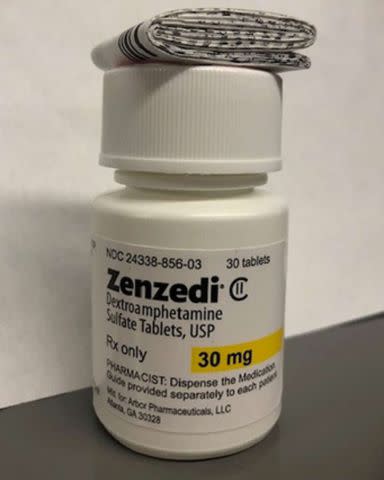ADHD Medication Recalled After Pill Mix-Up
A stimulant used to treat ADHD and narcolepsy has been recalled after a pharmacist found "sedative" medication mixed in with the pills

FDA
Zenzedi has been recalled after a pill mix-up.A medication that’s used to treat ADHD and narcolepsy has been recalled after other pills were found in a bottle of the drug.
The Food and Drug Administration announced manufacturer Azurity Pharmaceuticals’ voluntary recall Wednesday, saying “a pharmacist in Nebraska … opened a bottle of Zenzedi 30 mg tablets and found tablets of Carbinoxamine Maleate, an antihistamine drug.”
Zenzedi is a stimulant medication, which the Mayo Clinic explains is “typically the most commonly prescribed medications for ADHD.” It's also used to treat narcolepsy, a sleep disorder characterized by drowsiness and falling asleep suddenly throughout the day.
However, the antihistamine found in the bottle “has sedative properties,” the National Institute of Health says.

FDA
A bottle of Zenzedi.And as the FDA warns in its recall notice, “there is a reasonable probability that accidents or injuries that occur due to the sedating effects of carbinoxamine, could lead to ongoing disability or death in severe cases, particularly if individuals who use it (unaware that they have not received Zenzedi) engage in activities requiring significant focus and alertness (e.g., driving, operating heavy machinery).”
The two drugs do look vastly different, with Zenzedi being a yellow hexagonal pill with “30” on one side, and “MIA” on the other. The Carbinoxamine Maleate tablets found in the bottle of the stimulant were white and round, with “GL” on one side and “211” on the other.
The recalled Zenzedi has the lot number F230169A, with a June 2025 expiration date.
The United States is still experiencing a shortage of medication for ADHD, the more common abbreviation for Attention Deficit Hyperactivity Disorder, which “includes a combination of persistent problems, such as difficulty sustaining attention, hyperactivity and impulsive behavior,” the Mayo Clinic explains.
Although ADHD is characterized by hyperactivity, stimulants are most often prescribed to treat symptoms.

FDA
Zenzedi is small and yellow.“Despite their name, stimulants don’t work by increasing your stimulation,” the Cleveland Clinic explains. “Rather, they work by increasing levels of certain chemicals (neurotransmitters) in your brain called dopamine and norepinephrine. These neurotransmitters play important roles in your ability to pay attention, think and stay motivated. Studies have shown that approximately 80% of children with ADHD have fewer symptoms after finding the correct stimulant medication and dosage.”
Related: Kit Harington Says He Was Diagnosed with ADHD in Rehab: I 'Managed to Forge a New Life'
Not taking ADHD stimulant medication regularly “can lead to withdrawal while also increasing ADHD symptoms,” Verywell Mind wrote.
However, at the time of the FDA's announcement, no “serious adverse events related to this recall” have been reported.
Never miss a story — sign up for PEOPLE's free daily newsletter to stay up-to-date on the best of what PEOPLE has to offer, from celebrity news to compelling human interest stories.
For more People news, make sure to sign up for our newsletter!
Read the original article on People.


